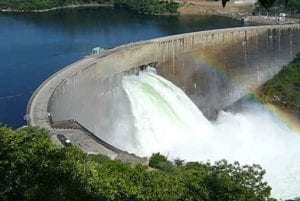Arrangements to finalise preparations in support of the rehabilitation of the Kariba Dam saw the recent hosting of representatives from the African Development Bank (AfDB), the European Union (EU), the Swedish Embassy to Zambia and the World Bank Group (WBG) by the Zambezi River Authority (ZRA).
The rehabilitation work on the dam has an estimated price of around US$290 million. The European Union intends to mobilize US $100 million while the WBG proposes to finance US$75 million. ZRA is also seeking at US $75 million from the AfDB. The Government of Sweden is confirming its commitment to cover another US $30 million while the rest of the balance will be sourced from counterpart funds by the Zambezi River Authority. “The outcome of the meetings between the two governments and the Cooperating Partners has been successful. A number of issues relating to implementation were discussed which paves the way to ensure the rehabilitation works are adequately funded, with expertise that will undertake the project to meet international safety standards to give a new lease of life to the Kariba Dam,” said Zambezi River Authority chief executive officer, Munyaradzi Munodawafa, speaking at the end of a series of meetings between the cooperating partners and officials from the two governments.“A failure to invest in the timely rehabilitation of the dam will result in the gradual degradation of key dam safety features to a level below international standards. Therefore, this rehabilitation project, which represents the culmination of a series of in-depth technical studies over the past few years, is absolutely crucial and urgent, and will restore the full safety of the dam.”
Freddie Kwesiga, the AfDB country representative stated, “I am impressed with the great team work and sense of urgency by the technical teams of the financing institutions and ZRA. They have shown that working together among Cooperating Partners can achieve greater development results”. He added that, “the rehabilitation is important in that it will also secure an already constrained generation capacity in the southern African region.






